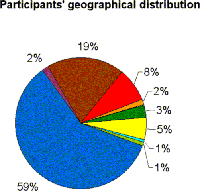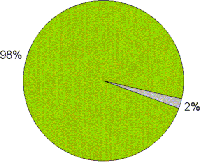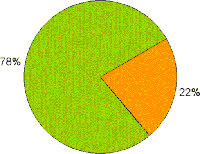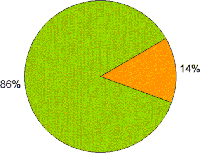
Fourth Analytical Summary
![]() de Hervé Maillot, Allié. France
, 4 de julio de 2005
de Hervé Maillot, Allié. France
, 4 de julio de 2005
1 - Preliminary Remarks
This report is based on 130 answers to the questionnaire (116 of which were on line by June 10). As things stand today, the following elements of the consultation stand out distinctly:
![]() The number of answers is low in proportion to the number of people solicited, with a less than 3 percent participation rate.
The number of answers is low in proportion to the number of people solicited, with a less than 3 percent participation rate.
![]() The answers are massively favorable to the Constituent Charter project with a very high approval percentage (the rest of the answers being more or less critical but never in complete opposition).
The answers are massively favorable to the Constituent Charter project with a very high approval percentage (the rest of the answers being more or less critical but never in complete opposition).
![]() The disagreements, the lack of understanding, and the questions expressed are both not very many and extensively shared by those who express them (between 10 and 20 percent of the participants depending on the question).
The disagreements, the lack of understanding, and the questions expressed are both not very many and extensively shared by those who express them (between 10 and 20 percent of the participants depending on the question).
The very low number of answers raises questions and begs the issue of representativeness. An outside view cannot consider this issue a priori by giving every answer and every silence the same importance. It is probably necessary to ponder these answers and failure to answer in terms of the connections that link the persons who were solicited to the Alliance and of their level of involvement (time and intensity) of these latter in the collective process/project that the Alliance is.
New answers are however still being sent. Given the inertia of the consultation process, we can expect a total of a few hundreds answers by September. This report could then be seen as a progress report.
Below, a few quotes illustrate this qualitative summary. They were chosen for their expression of a shared feeling and as sufficiently representative of the considerations existing beyond the very broad "yes to the project."
2 - Approval of the Project
The idea of the Alliance and the project for a Charter are in profound agreement with what participants feel. Extracts...
On the motivations of the FPH: "... the determination to take what seriously each brings, to organize the memory of it, the capitalization and the restitution does of the Foundation an irreplaceable instrument... "
On the relevance of the Alliance: "... Yes, as the complexity of the today’s world requires collective and coherent action ..." Or yet: "... To establish continuous communication with all the organizations that have the same purposes ... "
On the Charter: "... It contains and represents the foundations that are necessary for the healthy continuation of activities, Utopias, and the dreams to be launched into reality in order to build our future sensible, reasonable, sustainable, and plural days... "
Voices and hearts speak in unison to express the need and the emergency of assembling, interconnecting, and working together for the emergence of alternatives to the evolution of the world. The answers show how much the finding, rejection, and conviction mentioned in the paragraph "Objectives of the Alliance" of the Charter proposal, on which the involvement of the Allies is actually based, are, in fact, the finding, rejection, and conviction of the participants. The same convergence of views applies to the nature of the Alliance. Five of the seven aspects describing what the Alliance is are in perfect keeping with the words of Allies, friends, and associates. Only the points dealing the vision of a global community to be built, on the one hand, and on the other hand the matrix, or nervous center of the Alliance that is represented by the Web site are problematic (see next paragraph).
3 - That Which Is Disputed
"... I believe that the major justification of the Alliance is that there is today a ’citizen of the world’ who can weigh, as such, on humankind’s destiny. The whole question is knowing HOW ... " This excerpt from an answer perfectly sums up the discussion that the consultation has brought to light: although there is almost total agreement on WHY, Allies do not agree on HOW.
3.1 - The Charter Project initiative
Since the consultation deals with the content of the Charter, we must first note that there are two opposite opinions on the subject. One point of view expresses disagreements, incomprehension, and questions that reveal and provide a more-or-less eloquent illustration of "the specific contradictions that need to be overcome by the Alliance as it moves out of its first stage" (paragraph 4 of the document describing the position of the FPH). This point of view seems to say that the arbitration and/or innovations proposed by the Charter to solve these contradictions do not meet the expectations of those who express them: "... the FPH does not seem to make good use the of tensions born in the past regarding the governance of the Alliance. The Constituent Charter is a document that is presented as a take-it-or-leave-it proposition; whereas one could conceive it as document to start up a movement... ". On the opposite position, we have "... I must say that this constituent charter is a good effort and incorporates several suggestions made at Mumbai and Porto Alegre ..."
3.2 - Relations between the FPH and the Alliance
One participating thinks that the working procedures "... should distinguish which is the spring of the governance of the Alliance of which is of him ’working program’ of the Allies... " . This confusion that is felt is also expressed in the disagreements and their corresponding arguments: the tension generated by the difficulty of properly stating the governance-organization-chart-decision-program equation is perceptible. It seems that this confusion comes from the relation that links the FPH to the Alliance. For many participants, FPH and Alliance are not dissociated. The FPH has a unique Ally status and particular power: power "to" for some, power "over" for others. Funder and mother of the Alliance, such is the FPH. It is also (and wishes to be) independent and sovereign. This is well understood, no one seeming to ignore its own definition of itself on the home page of its Web site: "An independent Foundation backing the emergence of a global community." But this poses a problem for the Allies whose objectives, missions, and desired strategic choices do not match the Foundation’s concerns and guidelines. Some participants expect the Alliance to be not only a place for sharing views and a pool of ideas, but also a tool for continued support (including financial) for Allies involved in action, which refers to the desire for support to specific projects, thematically and geoculturally circumscribed. Everybody understands that the existing tensions are intimately related to the (encouraged or questioned) position of the Foundation "... which remains central because it will remain, unfortunately, the essential funder of the Alliance dynamics ..."
3.3 - On the differences / disagreements in the Allies’ motivations
Schematically, the answers give the impression that a more-or-less contradictory debate is organized around two positions. A first position, which we will call the Charter position, gathers the highest approval rate (greater than 80 percent). Those who hold the Charter position provide a frank and massive "yes" to the text and to the FPH, author of the text. Other participants offer, or even claim a different position and describe a gap between on the one hand a structuring vision calling to invest in the organizational and the functional, and on the other hand an action-oriented, or even militant, vision focusing on the operational. This gap is illustrated by semantic oppositions: abstract/concrete, future/present, global/local, thinking/action. It is somewhat as if some, seen as privileging the methods office, were not in agreement with the others, perceived as wishing to concentrate on action on the field. A call for "results" is launched. Some speak of pressure to be exercised on "decision-makers" and even of lobbying actions. To illustrate these semantic oppositions, here are a few excerpts:
"... How can we make it so the action of the Alliance is not limited to theoretical considerations and obtains results, on the contrary, at the level of tangible realities"?
"... In my opinion, the general goal of the new Alliance should be to have an impact on reality by putting into good use (directly or letting social movements do it) some of the proposals that it has generated ..."
"... Building the Alliance, respecting its nature and principles, is a task that is only possible through the concrete action of Allies in whatever territorial or institutional space they are in ... ".
"... Although the objectives are clear, I don’t see, in the Charter, the processes through which we can come closer to them, in particular through pressure, action, and influence on the governments, which, at the end of the day, remain the "decision makers" for everything... ".
Some disagreements also deal with the issue of building a global community, a preliminary and therefore important objective for some: "... The Constituent Charter proposals are a source of wealth, as priority is given to building a global community ... "; the final result of building from the local to the global for others. Others yet place the target elsewhere: "... I still have major ideological and political doubts regarding the interest and the relevance of ’restricting’ the objective, the very mission of the Alliance to the construction of a global community. This is not, in my thinking and convictions, a purpose but a means; I am deeply a humanist and remain a convinced democrat, and these two pillars are never better expressed and experienced daily than in a significant and meaningful territory, therefore at the local or micro local level."
3.4 - The informal nature of the Alliance
One point on which a number of Allies agree is that of the weak legibility and visibility of the Alliance, of its lack of a communication strategy, of its distance from the media. The desire to institutionalize the Alliance in order to allow it to weigh in some way or another on the international bodies is clearly expressed. But other participants favor the openness and absence of a "common voice" that characterize the Alliance.
3.5 - The operational nature of the working procedures and the calendar
On these points, some observation expressed as proposals call on reinforcing the crosscutting nature of actions within the Alliance and the capacity to establish contacts with outside actors.
".. I agree with the idea of a common calendar, but the question is also to see how it can be articulated with the calendars of the multilateral institutions and others, as that of the alterglobalization movement, for instance. In short, how can we keep our autonomy and irrigate more institutionalized forums of debate ... "
’`... I welcome the proposal of the Common Calendar. However, I feel it lacks clear tasks and aims for the new stage: more intimate collaboration between the various workgroups, workshops, and colleges of the Alliance; articulation with other social movements (the WSSE is actively pursuing that pressure for consistent public policies and for institutional transformation of agencies of national and global governance; production of collective documents and educational materials on transversal themes that go beyond the products of the first stage; deeper reflection based on a transdisciplinary approach; continental meetings and a global meeting before the end of the new stage..."
3.6 - Alliance follow-up and facilitation groups and committees
No real disagreements on this subject. Only questions and need for further explanation. The group of guarantors is what inspires the most observations. It is perceived indispensable, but insufficient and not geoculturally balanced enough. Questions are raised as to how it will work: Who? How? Why? And on its power or its effectiveness: "... The 7 members of the arbitration body will be either too powerful or will drown under the mass of information: the Proposal Papers being contradictory by nature, who is going to arbitrate and in the name of what? ... "
3.7 - The Web site and its usefulness
The importance of the Web site in the collective process that the Alliance is seems to exclude the (numerous?) Allies not having the required technology. One answer mentions the two billion human beings who have no domestic electricity. Another guards against the atrophied type of relations that the Internet (predominant in a network such as the Alliance) induces: "... I am skeptical regarding the fact that the Internet is going to make it possible to share the experiences of the Alliance. A tool always reduces things and the power of the computer brings about more juxtaposition than confrontation ... Nothing can replace interpersonal contact. I think that the Alliance already understood this in the dynamics for the preparation of the World Assembly in Lille."
4 - A First Conclusion
This is what can be said from an outside point of view (which is necessarily partial and fragmented): The FPH - architect, funder (among others) - and the Allies - craftsmen of all countries (among others) - have endeavored for ten years to work together for the edification of a global village (among others). All participants more-or-less explicitly express their joy of being a part of this (90 percent intend to participate in the second stage of the Alliance). In the perspective of making the idea of unity in diversity more operative, more spacious, and more fertile, it seems necessary to lift, as a priority, the constraint of having a single financial source.
"...I am most amazed and disappointed that the goal ’support the future development of the Alliance’ does not make any reference to funding!!!!!... Yes, we need good rules, but we need funding other than FPH’s too.
As you may know, I have undertaken a co-funding mission for the Alliance for over two years now and the results have not been what we expected. As the FPH position text mentions, the innovative approach of the Alliance, and the identity confusion between FPH/Alliance makes it difficult for traditional funders to support our work. Knowing how difficult it is, but also how crucial for the future of the Alliance, I propose that one of the working procedures deal specifically with this issue. That is where I could participate more actively. Let’s not be afraid to talk about rules, but let’s not be afraid either to talk about money..."
GRÁFICOS CUANTITATIVOS
![]()
|
||
Antes de reaccionar a esta síntesis, le animamos por favor a enviarnos previamente sus respuestas al cuestionario si no lo ha hecho ya.
TRADUCCIÓN
- français
- Español
Otras síntesis
 Primera síntesis |12 de mayo de 2005 |
Primera síntesis |12 de mayo de 2005 |
 Secunda síntesis |20 de mayo de 2005 |
Secunda síntesis |20 de mayo de 2005 |
 Tercera síntesis |8 de junio de 2005 |
Tercera síntesis |8 de junio de 2005 |
 Quinta síntesis |10 de agosto de 2005 |
Quinta síntesis |10 de agosto de 2005 |
 Sexta Síntesis |13 de septiembre de 2005 |
Sexta Síntesis |13 de septiembre de 2005 |
 Informe definitivo sobre el proyecto de Carta constitutiva para la Alianza por un mundo responsable, plural y solidario |6 de diciembre de 2005 |
Informe definitivo sobre el proyecto de Carta constitutiva para la Alianza por un mundo responsable, plural y solidario |6 de diciembre de 2005 |
- Alianza para un mundo responsable, plural y solidario -
- Fundación Charles Léopold Mayer para el progreso del Hombre -







